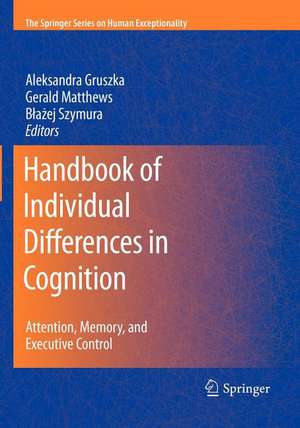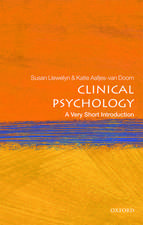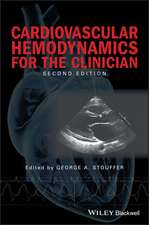Handbook of Individual Differences in Cognition: Attention, Memory, and Executive Control: The Springer Series on Human Exceptionality
Editat de Aleksandra Gruszka, Gerald Matthews, Blazej Szymuraen Limba Engleză Paperback – 10 feb 2012
Breaking down cognition in terms of attentional mechanisms, working memory, and higher-order processing, contributors discuss general models of cognition and personality. Chapter authors build on this foundation as they revisit current theory in such areas as processing effort and general arousal and examine emerging methods in individual differences research, including new data on the role of brain plasticity in cognitive function. The possibility of a unified theory of individual differences in cognitive ability and the extent to which these variables may account for real-world competencies are emphasized, and commentary chapters offer suggestions for further research priorities.
Coverage highlights include:
- The relationship between cognition and temperamental traits.
- The development of autobiographical memory.
- Anxiety and attentional control.
- The neurophysiology of gender differences in cognitive ability.
- Intelligence and cognitive control.
- Individual differences in dual task coordination.
- The effects of subclinical depression on attention, memory, and reasoning.
- Mood as a shaper of information.
| Toate formatele și edițiile | Preț | Express |
|---|---|---|
| Paperback (1) | 608.75 lei 6-8 săpt. | |
| Springer – 10 feb 2012 | 608.75 lei 6-8 săpt. | |
| Hardback (1) | 1436.77 lei 6-8 săpt. | |
| Springer – 21 apr 2010 | 1436.77 lei 6-8 săpt. |
Din seria The Springer Series on Human Exceptionality
- 18%
 Preț: 1013.96 lei
Preț: 1013.96 lei - 15%
 Preț: 645.14 lei
Preț: 645.14 lei - 18%
 Preț: 976.54 lei
Preț: 976.54 lei - 5%
 Preț: 718.10 lei
Preț: 718.10 lei -
 Preț: 384.48 lei
Preț: 384.48 lei - 15%
 Preț: 645.79 lei
Preț: 645.79 lei - 18%
 Preț: 954.62 lei
Preț: 954.62 lei -
 Preț: 390.46 lei
Preț: 390.46 lei - 18%
 Preț: 998.79 lei
Preț: 998.79 lei -
 Preț: 386.99 lei
Preț: 386.99 lei - 18%
 Preț: 900.29 lei
Preț: 900.29 lei - 20%
 Preț: 552.13 lei
Preț: 552.13 lei - 15%
 Preț: 533.72 lei
Preț: 533.72 lei - 18%
 Preț: 1404.15 lei
Preț: 1404.15 lei - 18%
 Preț: 1115.63 lei
Preț: 1115.63 lei - 15%
 Preț: 643.48 lei
Preț: 643.48 lei - 18%
 Preț: 1123.04 lei
Preț: 1123.04 lei
Preț: 608.75 lei
Preț vechi: 640.78 lei
-5% Nou
Puncte Express: 913
Preț estimativ în valută:
116.50€ • 126.50$ • 97.86£
116.50€ • 126.50$ • 97.86£
Carte tipărită la comandă
Livrare economică 22 aprilie-06 mai
Preluare comenzi: 021 569.72.76
Specificații
ISBN-13: 9781461432173
ISBN-10: 1461432170
Pagini: 520
Ilustrații: XXIV, 494 p.
Dimensiuni: 178 x 254 x 27 mm
Greutate: 0.89 kg
Ediția:2012
Editura: Springer
Colecția Springer
Seria The Springer Series on Human Exceptionality
Locul publicării:New York, NY, United States
ISBN-10: 1461432170
Pagini: 520
Ilustrații: XXIV, 494 p.
Dimensiuni: 178 x 254 x 27 mm
Greutate: 0.89 kg
Ediția:2012
Editura: Springer
Colecția Springer
Seria The Springer Series on Human Exceptionality
Locul publicării:New York, NY, United States
Public țintă
Professional/practitionerCuprins
General Models of Individual Differences in Cognition.- Individual Differences in Cognition: in Search of a General Model of Behaviour Control.- Individual Differences in Cognition: New Methods for Examining the Personality-Cognition Link.- The Relationship Between Intelligence and Pavlovian Temperament Traits: The Role of Gender and Level of Intelligence.- General Models of Individual Differences in Cognition: The Commentaries.- Individual Differences in Cognition from a Neurophysiological Perspective.- Neuroscientific Approaches to the Study of Individual Differences in Cognition and Personality.- Cognitive Neuroscience Approaches to Individual Differences in Working Memory and Executive Control: Conceptual and Methodological Issues.- Emotional Intelligence and Gender: A Neurophysiological Perspective.- Learned Irrelevance Revisited: Pathology-Based Individual Differences, Normal Variation and Neural Correlates.- Post-Soviet Psychology and Individual Differences in Cognition: A Psychophysiological Perspective.- Individual Differences in Cognition from a Neurophysiological Perspective: The Commentaries.- Individual Differences in Attentional Mechanisms.- Psychopathology and Individual Differences in Latent Inhibition: Schizophrenia and Schizotypality.- Attentional Control Theory of Anxiety: Recent Developments.- Task Engagement, Attention, and Executive Control.- Individual Differences in Resource Allocation Policy.- The Relationship of Attention and Intelligence.- Intelligence and Cognitive Control.- Individual Differences in Attention: The Commentaries.- Individual Differences in Working Memory Functioning and Higher-Order Processing.- Trait and State Differences in Working Memory Capacity.- Adrift in the Stream of Thought: The Effects of Mind Wandering on ExecutiveControl and Working Memory Capacity.- The Unique Cognitive Limitation in Subclinical Depression: The Impairment of Mental Model Construction.- Working Memory Capacity and Individual Differences in Higher-Level Cognition.- Motivation Towards Closure and Cognitive Resources: An Individual Differences Approach.- Mood as Information: The Regulatory Role of Personality.- Autobiographical Memory: Individual Differences and Developmental Course.- Individual Differences in Working Memory and Higher-Ordered Processing: The Commentaries.- Conclusion: The State of the Art in Research on Individual Differences in Executive Control and Cognition.
Recenzii
“This is a detailed discussion of the Mind/Brain dichotomy and its relationship to brain function in normal and abnormal subjects. … This book is of value for neurophysiologists, psychologists, students, fellows and all interested persons having an interest in this controversial area.” (Joseph J. Grenier, Amazon.com, May, 2015)
“This handbook, part of the Springer Series on Human Exceptionality, looks at exceptionality in terms of cognition, specifically attention and working memory. … The target audience includes ‘researchers, clinicians, and graduate students in psychology and cognitive sciences, including clinical psychology and neuropsychology, personality and social psychology, neuroscience, and education.’ … It is fairly comprehensive and contains hundreds of references so readers can follow up on topics of interest. … If you love cognitive science and neuroscience … this is the book for you.” (Gary B. Kaniuk, Doody’s Book Reviews, January, 2011)
“This handbook, part of the Springer Series on Human Exceptionality, looks at exceptionality in terms of cognition, specifically attention and working memory. … The target audience includes ‘researchers, clinicians, and graduate students in psychology and cognitive sciences, including clinical psychology and neuropsychology, personality and social psychology, neuroscience, and education.’ … It is fairly comprehensive and contains hundreds of references so readers can follow up on topics of interest. … If you love cognitive science and neuroscience … this is the book for you.” (Gary B. Kaniuk, Doody’s Book Reviews, January, 2011)
Notă biografică
Aleksandra Gruszka, Ph.D., is an Assistant Professor of Psychology at Jagiellonian University, Kraków, Poland, and a life member of Clare Hall, Cambridge University, United Kingdom. She has a particular interest in psychology of creativity and neuropsychology of Parkinson’s disease. In 2004, Dr Aleksandra Gruszka was awarded a Wellcome Travelling Fellowship by the Wellcome Trust, which enabled her to spend two years at the MRC Cognition and Brain Sciences Unit, Cambridge, United Kingdom. As a result, a number of collaborative projects with Dr. Adrian Owen were undertaken, including behavioral testing of novel psychological paradigms, functional neuroimaging studies of attentional mechanisms and clinical investigations in Parkinson’s disease using both techniques. She has published in the field of individual differences in cognition (Creativity Research Journal), and she has co-authored several books and chapters on creativity (Creativity Training, International Handbook of Creativity, Creativity’s Global Correspondents, 2002) and neuropsychology (Neuropsychology, Neuropsychologia).
Gerald Matthews, Ph.D., is Professor of Psychology at the University of Cincinnati. His research focuses on human performance, cognitive models of personality, the assessment of acute states of stress and emotion, and emotional intelligence. He has published more than 200 journal articles and book chapters on these topics. He has co-authored books on Attention and Emotion: A Clinical Perspective, Personality Traits, Human Performance: Cognition, Stress and Individual Differences and Emotional Intelligence: Science and Myth. His book on Attention and Emotion won the 1998 British Psychological Society Book Award, and the book on Emotional Intelligence was commended by the Association of American Publishers in their 2002 awards. He is also editor of Cognitive Science Perspectives on Personality and Emotion. He is the elected Secretary-Treasurer of the InternationalSociety for the Study of Individual Differences. He has acted as a consultant for several organizations, including Procter and Gamble and the MIT Electronics Research Lab. He is also an associate editor for Personality and Individual Differences, and a consulting editor for Journal of Experimental Psychology: Applied.
Blazej Szymura, Ph.D., is an Assistant Professor of Psychology at Jagiellonian University, Kraków, Poland and Warsaw School for Social Psychology, Poland. The main areas of his research interests are: preattentional and attentional mechanisms, unconscious information processing, cognitive correlates of temperamental and personality traits, creativity and innovation. He has co-authored books on Cognitive Psychology, Individual Differences Psychology, Creativity Training and published as first author or as co-author nearly 30 journal articles (Neuropsychology, Personality and Individual Differences, Polish Psychological Bulletin) as well as book chapters (Advances in Personality Studies). He was honored by Jagiellonian University (1999) and Warsaw University (2006) for the best publication of the year. He has acted as an associate editor for the special issue of Studia Psychologiczne on Aspects of Attention. He has also lead many creativity training and invention sessions for managers and employees of several major organizations (Leroy Merlin, Motorola and Masterfood).
Gerald Matthews, Ph.D., is Professor of Psychology at the University of Cincinnati. His research focuses on human performance, cognitive models of personality, the assessment of acute states of stress and emotion, and emotional intelligence. He has published more than 200 journal articles and book chapters on these topics. He has co-authored books on Attention and Emotion: A Clinical Perspective, Personality Traits, Human Performance: Cognition, Stress and Individual Differences and Emotional Intelligence: Science and Myth. His book on Attention and Emotion won the 1998 British Psychological Society Book Award, and the book on Emotional Intelligence was commended by the Association of American Publishers in their 2002 awards. He is also editor of Cognitive Science Perspectives on Personality and Emotion. He is the elected Secretary-Treasurer of the InternationalSociety for the Study of Individual Differences. He has acted as a consultant for several organizations, including Procter and Gamble and the MIT Electronics Research Lab. He is also an associate editor for Personality and Individual Differences, and a consulting editor for Journal of Experimental Psychology: Applied.
Blazej Szymura, Ph.D., is an Assistant Professor of Psychology at Jagiellonian University, Kraków, Poland and Warsaw School for Social Psychology, Poland. The main areas of his research interests are: preattentional and attentional mechanisms, unconscious information processing, cognitive correlates of temperamental and personality traits, creativity and innovation. He has co-authored books on Cognitive Psychology, Individual Differences Psychology, Creativity Training and published as first author or as co-author nearly 30 journal articles (Neuropsychology, Personality and Individual Differences, Polish Psychological Bulletin) as well as book chapters (Advances in Personality Studies). He was honored by Jagiellonian University (1999) and Warsaw University (2006) for the best publication of the year. He has acted as an associate editor for the special issue of Studia Psychologiczne on Aspects of Attention. He has also lead many creativity training and invention sessions for managers and employees of several major organizations (Leroy Merlin, Motorola and Masterfood).
Textul de pe ultima copertă
As cognitive models of behavior continue to evolve, the mechanics of cognitive exceptionality, with its range of individual variations in abilities and performance, remains a challenge to psychology. Reaching beyond the standard view of exceptional cognition equaling superior intelligence, the Handbook of Individual Differences in Cognition examines the latest findings from psychobiology, cognitive psychology, and neuroscience, for a comprehensive state-of-the-art volume.
Breaking down cognition in terms of attentional mechanisms, working memory, and higher-order processing, contributors discuss general models of cognition and personality. Chapter authors build on this foundation as they revisit current theory in such areas as processing effort and general arousal and examine emerging methods in individual differences research, including new data on the role of brain plasticity in cognitive function. The possibility of a unified theory of individual differences in cognitive ability and the extent to which these variables may account for real-world competencies are emphasized, and commentary chapters offer suggestions for further research priorities.
Researchers, clinicians, and graduate students in psychology and cognitive sciences, including clinical psychology and neuropsychology, personality and social psychology, neuroscience, and education, will find the Handbook of Individual Differences in Cognition an expert guide to the field as it currently stands and to its agenda for the future.
Breaking down cognition in terms of attentional mechanisms, working memory, and higher-order processing, contributors discuss general models of cognition and personality. Chapter authors build on this foundation as they revisit current theory in such areas as processing effort and general arousal and examine emerging methods in individual differences research, including new data on the role of brain plasticity in cognitive function. The possibility of a unified theory of individual differences in cognitive ability and the extent to which these variables may account for real-world competencies are emphasized, and commentary chapters offer suggestions for further research priorities.
Researchers, clinicians, and graduate students in psychology and cognitive sciences, including clinical psychology and neuropsychology, personality and social psychology, neuroscience, and education, will find the Handbook of Individual Differences in Cognition an expert guide to the field as it currently stands and to its agenda for the future.
Caracteristici
Presents a unique approach to the subject of cognition, integrating different approaches to understand exceptionality in cognitive functions on the common basis of underlying biological mechanisms Offers a broad scope in contrast to already published volumes The book contains a comprehensive survey that relates most of the major individual difference constructs to specific mechanisms of cognitive control Includes supplementary material: sn.pub/extras









